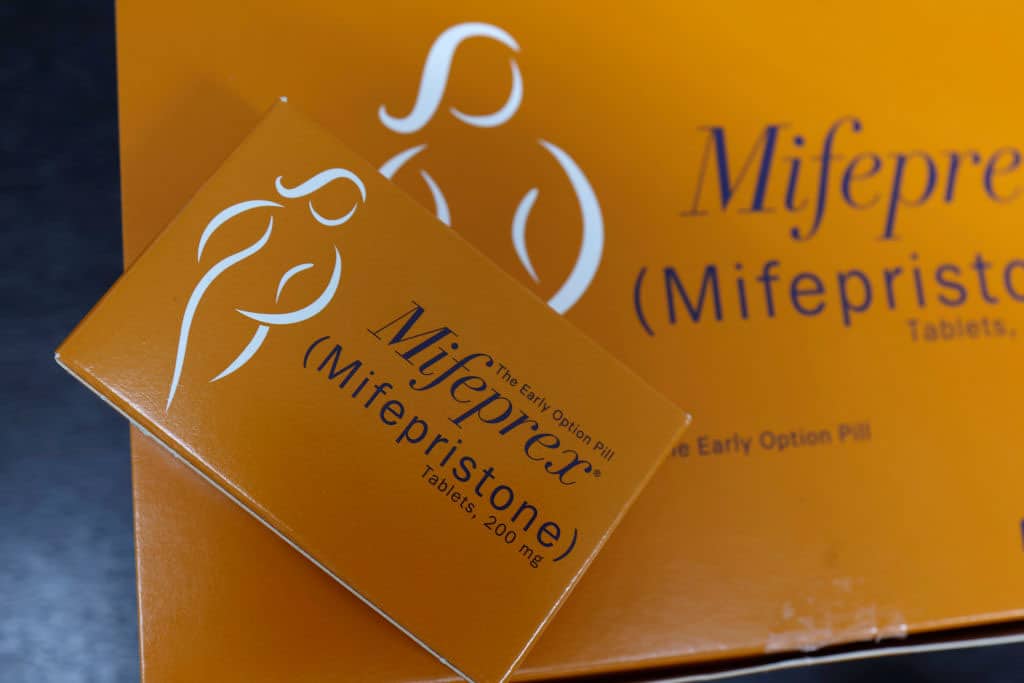 Packages of Mifepristone tablets are displayed at a family planning clinic on April 13, 2023 in Rockville, Maryland. (Photo illustration by Anna Moneymaker/Getty Images)
Packages of Mifepristone tablets are displayed at a family planning clinic on April 13, 2023 in Rockville, Maryland. (Photo illustration by Anna Moneymaker/Getty Images) I’m not an abortion provider, but I do have a long acquaintance with mifepristone, AKA RU 486, the abortion drug now entangled in federal court rulings. Now accounting for more than half of U.S. abortions, the drug blocks progesterone, the hormone that maintains fetal attachment to the placenta in pregnancy. Once administered, the procedure can be completed with the use of a second drug, misoprostol.
My involvement with mifepristone began in the early 1990s when it became commonly used in Europe. Hoechst Roussel, the drug’s owner, fearing the wrath of U.S. anti-abortion activists, refused access to the drug for U.S. researchers, even for indications unrelated to abortion.
The idea that outside parties with political agendas were curtailing my patients’ healthcare options was more than I could accept. Two colleagues and I founded “Physicians for RU 486” and recruited over 500 doctors to lobby for the drug’s release. Our leverage as prescribers of the company’s other drugs proved helpful. They relented and released its U.S. rights to the non-profit Population Council, which brought a new drug application to the FDA. The drug was approved in 1994.
After nearly three decades, a ruling by Texas District Court Judge Matthew Kacsmaryk now threatens this important patient option. Any medically informed individual reading his 61-page decision would be struck by its lack of scientific integrity. It reads like an anti-abortion polemic. The contrast with the tone of Justice Harry Blackmun’s now overruled Roe v. Wade could not be starker or more disturbing. Blackman, after a careful review of the historic legal question of when life begins, humbly concluded that “the judiciary at this point in the development of man’s knowledge, is not in a position to speculate as to the answer.” Judge Kacsmyrak’s opinion shows no such humility. His bias becomes apparent right out of the gate with the comment that mifepristone is used “to kill the unborn human.” Invoking an inflammatory phrase rather than the scientific and more neutral term “fetus” or “embryo” reveals the bias one might expect of one who served as deputy counsel for the far-right Christian activist organization, First Liberty Institute. While there, Kacsmyrak submitted an amicus brief to the Supreme Court to restrict contraceptive access. Unfortunately, American jurisprudence allows plaintiffs to shop for a courtroom where the judge openly shares their biases.
The veracity of the science referenced in the ruling predictably follows the biases, ignoring the findings of major studies and depending upon cherry-picked anecdotes. In explaining why the plaintiffs, a collection of anti-abortion provider groups, merit standing to challenge the FDA the Judge commented that they “allege adverse events that place ‘enormous stress and pressure’ on doctors during emergencies and complications.” This one comment, so transparently deceptive, should be sufficient to impugn the credibility of the entire decision. The major complication rate for first-trimester abortion is recognized by studies as being about 0.24%. So the 50,000 annual abortions performed in Texas prior to the Dobbs decision would produce about 120 major complications per year. The notion that physicians caring for 30 million Texans could be overwhelmed by a toll far less than one major abortion complication per day would be laughable in mixed company, much less in a judicial decision.
Outrageously, Judge Kacsmaryk’s decision neglects any consideration of the consequences for those potentially denied abortion services due to his ruling. The Judge might consider maternal mortality. In the U.S. in 2021 maternal mortality was about 23.8 deaths per 100,000, worst of the eleven developed countries in the Organization for Economic Cooperation and Development (OECD). In 2020 the maternal mortality rate in Texas increased to a shocking 72.7 per 100,000 or about three times the U.S. average. A woman denied an abortion with mifepristone in Texas faces more than a 100-fold increase in mortality if forced to deliver an infant in Texas.
A woman denied an abortion with mifepristone in Texas faces more than a 100-fold increase in mortality if forced to deliver an infant in Texas.
Judge Kacsmaryk’s belief that abortion kills children is debatable as Justice Blackmun showed. What is beyond debate is that abortion services including mifepristone save lives in Texas by keeping women away from the state’s abominable maternity services.
Adult lives matter too. If Judge Kacsmaryk and the plaintiffs truly care about saving lives, they should leave his courtroom, head to the state legislature and demand improvements in the state’s appalling healthcare system.
Daniel Stone is Regional Medical Director of Cedars-Sinai Valley Network and a practicing internist and geriatrician with Cedars Sinai Medical Group. The views expressed in this column do not necessarily reflect those of Cedars-Sinai.























 More news and opinions than at a Shabbat dinner, right in your inbox.
More news and opinions than at a Shabbat dinner, right in your inbox.